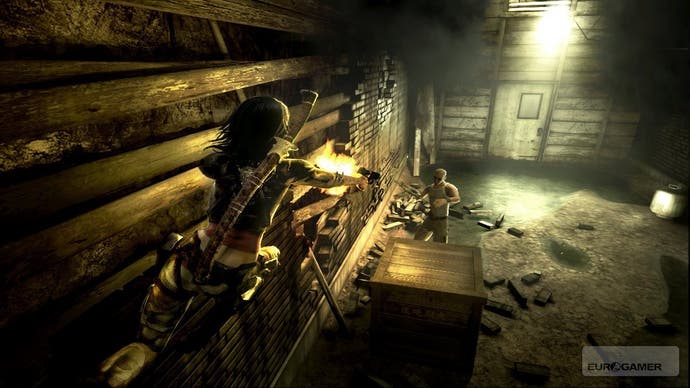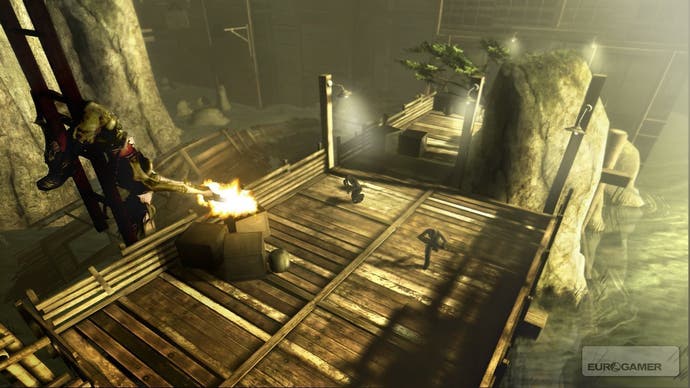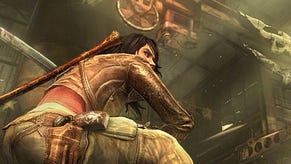WET
Back from the dead, fresh from the salon.
In a nice break from miserly tradition, bullet-time isn't tied to a meter, either: instead, it's linked in with your own movements, the emphasis placed on chaining fancy moves together rather than popping out for a moment or two of high-flying nonsense and then cowering behind a ledge for the best part of a minute while you get your breath back. By knotting flair so tightly to efficiency, Wet asks you to take chances, making stylish gymnastics your standard method of attack, rather than a lively scripted treat that gets wheeled out at ten-minute intervals once you've charged up a handful of gauges.
And if shooting gets dull, you can mix in some swordplay. The katana strung across Rubi's back probably causes problems when she has to get on a Routemaster, but it's ideal for unleashing a range of melee attacks, equally suited to slicing people in half, breaking open doors and smashing crates. (Wet is, naturally, just the kind of game where there are piles of crates lying around everywhere.)
The big scores will presumably come with a Zen-like balance of both weapons, and while the katana initially seems like a bit of an afterthought, it comes into its own in the game's pace-changing Rage sequences, where the screen turns a blood red as Rubi gets a bit ticked off at things, and enemies explode in stylised scribbles under the onslaught of super-powered attacks. Sparingly used, and entirely combo-focused, Rage is a dashing frenzy of point-scoring slaughter that sees you handing out violence with a murderous glee never before seen outside of that River Cottage programme where the mild-mannered hippy cheerfully butchers a llama in his bathtub while kids play about at his feet.

Other pace-changers we're shown are locked-down arenas which will slowly fill up with baddies until you shut down the various spawn points, and, to conclude things, a slightly over-stretched QTE-rich shooting gallery staged along a few miles of highway, as Rubi pursues her quarry by indulging in an expensive blast of car-surfing. Neither are particularly adventurous, but both look fun and suggest a willingness to change gears and smack you about with empty spectacle.
Visually, Wet's been built for speed and destructibility rather than looks, but there's a colourful no-nonsense charm to the characters and locations. The rich red drapes and golden dragons of Chinatown suggest an art team that knows a lot about using colour, but, equally, this may just be the result of a familiar setting that is genuinely difficult to screw up. Either way, it's still a promising sign for a game with an allegedly globe-spanning agenda.

Like Rubi herself, A2M's Wet has had a questionable history, dropped unceremoniously by its first publisher Vivendi, bought back by the developer, before finally ending up with Bethesda Softworks, where it looks disconcertingly glam and cheery stuck alongside the murky forests of The Elder Scrolls or the tumbledown Washington of Fallout 3. Perhaps that's the idea, though. Wet is a grinning, inconsequential quick-fix kind of game (it will be if A2M gets it right, anyway) compared to the weighty otherworld politics of Bethesda's own titles. You won't be playing through stacked tiers of Assassin Guild missions or making difficult moral judgements about robots with Rubi. Instead, under a thick seventies cinema filter complete with scuffs and scratches, you'll stab people and shoot their friends with no thought for what tomorrow may bring.
Promisingly, the developer suggests it approaches level designs as if it was building skating parks, and it's the strength of that urge to refine your playthrough and perfect your racing line that will ultimately reveal whether Wet is worth your time. First impressions were not so good, a second glance is not so bad: only when we've had a chance to hold a controller for ourselves will we actually know whether Bethesda was right in picking this one up, and if death-dealing Rubi truly is a killer worth saving.
Wet is due out for PS3 and Xbox 360 this autumn.



